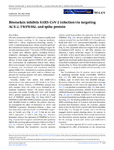Bromelain inhibits SARS-CoV-2 infection via targeting ACE-2, TMPRSS2, and spike protein
Sagar, Satish
Rathinavel, Ashok Kumar
Lutz, William E.
Struble, Lucas R.
Khurana, Surender
Schnaubelt, Andy T.
Mishra, Nitish Kumar
Guda, Chittibabu
Palermo, Nicholas Y.
Broadhurst, Mara J.
Hoffmann, Tobias
Bayles, Kenneth W.
Reid, St. Patrick M.
Borgstahl, Gloria E.O.
Radhakrishnan, Prakash
The new coronavirus, SARS-CoV-2, transmits rapidly from human-to-human resulting in the ongoing pandemic. SARS-CoV-2 infects angiotensin-converting enzyme 2 (ACE-2) expressing lung, heart, kidney, intestine, gall bladder, and testicular tissues of patients, leading to organ failure and sometimes death.1, 2 Currently, COVID-19 patients are treated with different agents, including favilavir, remdesivir, chloroquine, hydroxychloroquine, lopinavir, darunavir, and tocilizumab.3, 4 However, the safety and efficacy of those drugs against COVID-19 still need further confirmation by randomized clinical trials. Hence, there is an emergent need to repurpose the existing drugs or develop new virus-based and host-based antivirals against SARS-CoV-2. Bromelain is a cysteine protease isolated from pineapple stem and is used as a dietary supplement for treating patients with pain, inflammation,5 thrombosis,6 and cancer
Files in this item

